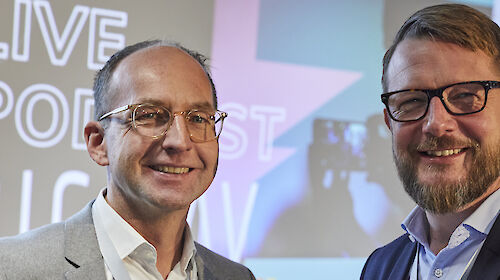"Event organizers need to become much more data driven"
GCB FutureTalks #19 with Davi Kaur, Head of Communications at the European Organization for Research and Treatment of Cancer (EORTC)
 © Davi Kaur / EORTC
© Davi Kaur / EORTC
Davi Kaur, Head of Communications at the European Organization for Research and Treatment of Cancer (EORTC), has recently spoken with Matthias Schultze to discuss her organization's approach to digital event formats as well as the industry's current challenges and the importance of data analytics for business events. Davi Kaur has been organizing scientific conferences for over twenty years and also serves on the PCMA advisory board.
Matthias Schultze: Your studies have focused on innovation management and digital strategies, among other things. Therefore, I was wondering what role the digitalization of event formats was playing for you and your team at EORTC prior to the COVID-19 outbreak and how its role has changed over the course of this year?
Davi Kaur: Before COVID-19, we dabbled in digitalizing events. Like many associations, we were offering livestreams and producing webcasts of our events, which we would make available once a conference was over. However, all of a sudden, we were forced to change our approach to digital event formats - we had to rethink digital platforms altogether! Traditional face-to-face meetings had to be adapted to fit onto the new platform and of course, time was of the essence. As we are a small team, we also had to find a platform that could be run within our team's capacity and that was cost-effective at the same time.
On top of that, roles within the team had to change - our team member in charge of operations took on the responsibility of taking care of and understanding how digital platforms work, for example. One of our main priorities was to adequately translate the unique characteristics of face-to-face meetings into the digital world. Therefore, we redesigned our event's agenda and split the program into live and on-demand sessions.
Given the limited space for interaction at online events, we also put extra consideration into how to promote attendee engagement. Obviously, we also had to discuss new offerings with our sponsors and exhibitors whilst adapting registration fees to accommodate the new platform at the same time. All in all, the team had to reshape the entire event, but now we know that we have the capacity to react to a changing environment very quickly.
If you had to name the three greatest challenges for the event industry as well as the opportunities stemming from them, what would they be?
I believe that we can open a number of new doors once we find answers to the following three questions: How do we move forward from this huge disruption? How are we going to adapt to this new environment? And how long is it going to take us to get back to face-to-face meetings? We know that virtual meetings allow us to engage with a wider audience, but this year has also highlighted the limitations of virtual networking opportunities.
Therefore, traditional face-to-face meetings and events won't go away anytime soon. But this does not mean that they have to return unchanged. There are plenty of other industries that we can learn from. Take a look at the sports world where teams can fill their stadiums whilst still having an even larger audience viewing virtually. For associations, this scenario means that they will have to take a careful look at how to engage with their members in order to ensure that each and every one of them feels that they are getting value from their membership.
Venues will also have to embrace current and future pushes in digitalization. Ultimately, we rely on their infrastructure when organizing our events. Simple things like adequate Wi-Fi and livestreaming capacities will need to be improved, for example. On the other hand, event organizers should be putting more consideration into the onsite experience, the layout and design of the event, the educational value and networking possibilities as well as the city experience in terms of getting to and from the venue, accommodation and hospitality. We want to see our delegates leave an event with a positive experience and the desire to come back for more. Those who cannot participate physically should also be able to gain at least 80 percent of the onsite experience virtually. It should be our goal to make them want to come back for the onsite event the next time.
Over the course of your career you were in charge of organizing congresses for up to 20,000 attendees. How would you approach the planning of such an event nowadays and which professional backgrounds would you include for the successful implementation of such an event?
One of the biggest changes over the course of my career has come with the introduction of digital platforms. The development of social media platforms and responsive websites has opened up entirely new ways of attracting delegates and association members. Digital marketing has become a very important aspect for events - from Search Engine Optimization and Search Engine Marketing all the way to influencers. Knowing how to successfully adopt digital marketing within your event organization and execution will reap tremendous rewards.
Additionally, data analytics has become one of my pet subjects. Measuring and analyzing data allows you to understand where an event's pressure points are. It allows you to understand whom you are engaging with and where you need to market to attract different types of audiences. Taking time to measure a delegate's time spent at registration, coffee and lunch breaks or on your conference website will allow you to adapt your systems. Market research on your delegates' needs will provide you with valuable insights, and tailoring your systems according to these insights will make them much more efficient. I believe that event organizers need to become much more data driven - especially in today's era of digitalization.
 ©
© ©
© ©
© ©
©